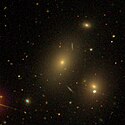IC 5357
| Galaxie IC 5357 | |
|---|---|
 | |
| IC 5357 mit IC 5352 (o.r)& IC 5351 (u.r.), SDSS-Aufnahme | |
| AladinLite | |
| Sternbild | Fische |
| Position Äquinoktium: J2000.0, Epoche: J2000.0 | |
| Rektaszension | 23h 47m 23,0s[1] |
| Deklination | -02° 18′ 02″[1] |
| Erscheinungsbild | |
| Morphologischer Typ | SAB0- pec:[1] |
| Helligkeit (visuell) | 13,0 mag[2] |
| Helligkeit (B-Band) | 14,0 mag[2] |
| Winkelausdehnung | 0,90 × 0,5[2] |
| Positionswinkel | 150°[2] |
| Flächenhelligkeit | 12.2 mag/arcmin²[2] |
| Physikalische Daten | |
| Rotverschiebung | 0,023123 ± 0,000073[1] |
| Radialgeschwindigkeit | (6932 ± 22) km/s[1] |
| Hubbledistanz vrad / H0 | (314 ± 22) · 106 Lj (96,4 ± 6,8) Mpc [1] |
| Geschichte | |
| Entdeckung | Edward Barnard |
| Entdeckungsdatum | 28. Oktober 1889 |
| Katalogbezeichnungen | |
| IC 5357 • PGC 72408/196632 • MCG -01-60-033 • 2MASX J23472298-0218025 • HCG 97A • GALEXASC J234723.03-021803.6 • LDCE 1594 NED005 | |
IC 5357 ist eine Elliptische Galaxie vom Hubble-Typ E/S0[2] pec im Sternbild Fische auf der Ekliptik. Sie ist rund 314 Millionen Lichtjahre von der Milchstraße entfernt und hat einen Durchmesser von etwa 80.000 Lichtjahren. Im gleichen Himmelsareal befinden sich die Galaxien IC 5351, IC 5352, IC 5356, IC 5359.
Das Objekt wurde 1889 von Edward Barnard entdeckt.[3]
Siehe auch
Weblinks
Einzelnachweise
Auf dieser Seite verwendete Medien
Autor/Urheber: Sloan Digital Sky Survey, Lizenz: CC BY 4.0

Angle of view: 4' × 4' (0.3" per pixel), north is up.
Details on the image processing pipeline: https://www.sdss.org/dr14/imaging/jpg-images-on-skyserver/


